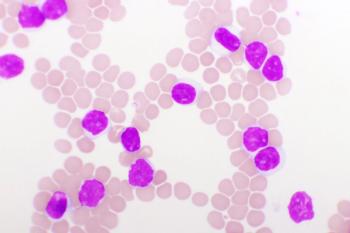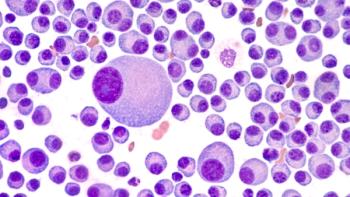
The FDA accepted a new drug application for belzutifan to treat von Hippel-Lindau disease¬–associated renal cell carcinoma and granted it priority review based on response rate results from a phase 2 trial.

Your AI-Trained Oncology Knowledge Connection!


The FDA accepted a new drug application for belzutifan to treat von Hippel-Lindau disease¬–associated renal cell carcinoma and granted it priority review based on response rate results from a phase 2 trial.

The use of next-generation imaging, like PSMA PET, has been shown to be superior compared with conventional imaging and may become a homestay in prostate cancer care in the future.

The latest episode of the podcast dissects a piece of original research from the Journal ONCOLOGY focusing on the impact of treatment refusal on patients with small cell lung cancer.

Based on promising responses seen across several clinical trials of poziotinib in patients with non–small cell lung cancer and exon 20 mutations in HER2, the FDA granted the therapy fast track designation.

Take a look back at some of the important news and notes from last week in the world of oncology, featuring news about breast cancer, prostate cancer, and urothelial cancer.

Promising overall survival results lead to an early stop to a phase 3 trial of cemiplimab versus chemotherapy in relapsed/refractory cervical cancer, according to the drug’s developer.

The new combination treatment of ublituximab plus ibrutinib resulted in a higher overall response rate and a tolerable safety profile for patients with relapsed or refractory high-risk CLL.

Combination chemotherapy treatment followed by individualized PET4-guided therapy allowed some patients with unfavorable Hodgkin lymphoma to forego radiotherapy while maintaining efficacy.

A bevacizumab-plus-chemotherapy combination improved progression-free survival for a cohort of patients with recurrent platinum-sensitive ovarian cancer, suggesting the potential for a future therapeutic path in clinical practice.

These data in Nature Communications found that Black men may derive survival benefits from immunotherapy treatment.

Leonard G. Gomella, MD, FACS, detailed updated information regarding the standard of care and overall management of patients with non-muscle invasive bladder cancer at the 2021 New York GU 14th Annual Interdisciplinary Prostate Cancer Congress®.

Scott G. Hubosky, MD, of Jefferson University Hospitals, discussed methods of treating patients with upper tract urothelial carcinoma at the 2021 New York GU 14th Annual Interdisciplinary Prostate Cancer Congress®.

CancerNetwork® sat down with Trevor J. Pugh, PhD, to discuss a novel protocol for detecting mismatch repair deficiency.

Indications for pembrolizumab, nivolumab, and atezolizumab are set for examination under the FDA’s Oncologic Drugs Advisory Committee for indications granted accelerated approval in breast, urothelial, gastric, and liver cancers.

Data on male patients with hormone receptor–positive breast cancer found treatment options that included GnRHa sustained a decrease in estradiol levels, reducing quality of life for this patient subset.

Pal detailed the plan for the CONTACT-03 study and what the research team hopes to see with the data.

The expert from SUNY Downstate Medical Center spoke about areas of research for renal cell carcinoma which he believes deserve further attention.

A phase 2 trial of single-agent AFM13, a bispecific tetravalent innate cell engager that binds to CD30, will continue following positive results of a preplanned interim futility analysis.

Independent variables, such as the burden of disease prior to treatment, molecular prognosis, sensitivity to chemotherapy, sensitivity to endocrine therapy, and sensitivity to other treatments could be effective in predicting risk of recurrence in patients with breast cancer.

Data from the POLLUX and CASTOR trials both found higher sustained MRD-negativity rates for daratumumab combination regimens compared with the standard-of-care treatments.

The trial investigated the association of bone metastatic burden and metastasis location with overall survival and failure-free survival, suggesting the potential for these data to predict survival benefits.

Based on results of the phase 3 TIVO-3 trial in patients who have previously received at least 2 lines of therapy for renal cell carcinoma, the FDA granted approval to tivozanib for use in this patient population.

The liquid biopsy assay RaDaR has been given a breakthrough device designation for use in the detection of minimal residual disease in early-stage cancers.

Kevin Kalinsky, MD, MS, discussed a number of antibody-drug conjugates, detailing the prevailing data and potential trials that may change the treatment paradigm for patients with breast cancer.

Data in The Lancet Oncology confirmed the standard of care as the optimal dosage to treat patients with indolent non-Hodgkin lymphoma.

Pal discussed the emergence of cabozantinib as a treatment option for patients with renal cell carcinoma and touched on future research around the drug.

Mandar Aras, MD, PhD, discussed the management and prevention of cardiotoxicity in patients receiving systemic therapy for breast cancer at the 38th Annual Miami Breast Cancer Conference, hosted by Physicians’ Education Resource®, LLC.

Data from Radiology found early positive results regarding the treatment of intermediate-risk prostate cancer with MRI-guided focused ultrasound ablation.

Novartis’ investigational interleukin-1β inhibitor canakinumab plus docetaxel failed to show a survival benefit in patients with previously treated locally advanced or metastatic non–small cell lung cancer, but other trials examining its efficacy remain ongoing.

During Colorectal Cancer Awareness month, CancerNetwork® sat down with Dorothy Dulko, PhD, to discuss social determinants of cancer.